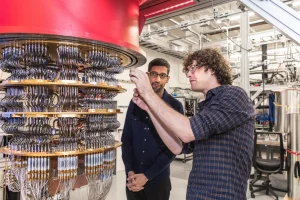Introduction
Quantum computing is a new type of technology that could change the way we solve big problems and handle data. It’s different from the computers we use today. While regular computers use bits that are either 0 or 1, quantum computers use special bits called qubits. These qubits can be both 0 and 1 at the same time, which is a powerful feature that helps quantum computers work much faster on certain tasks.
In this article, we’ll explain what quantum computing is, how it works, and why it could be a game-changer for many industries.
What is Quantum Computing?

Quantum computing is a type of computing that uses the principles of quantum mechanics—the science that explains how particles behave at the smallest scales. Unlike classical computers that use bits (0s and 1s) to process information, quantum computers use qubits, which can represent both 0 and 1 at the same time, thanks to a property called superposition.
Key Concept: Superposition and Entanglement
- Superposition: Think of a coin spinning in the air. While spinning, it’s both heads and tails until it lands. A qubit behaves similarly, holding multiple states at once, allowing quantum computers to process many possibilities simultaneously.
- Entanglement: When qubits become linked, changing the state of one instantly affects the other, even if they’re far apart. This phenomenon boosts computational power and speed in ways classical computers can’t match.
The Rise of Quantum Computing
It has moved from theory to reality faster than anyone expected. Companies like Google, IBM, and Microsoft are racing to develop powerful quantum computers, and governments are investing billions in quantum research.
Milestones in Quantum Technology
- 2019: Google claims “quantum supremacy” by solving a complex problem faster than the world’s best supercomputer.
- 2020s: Quantum startups and major tech companies increase investment, pushing quantum computers toward practical applications.
- Present Day: Quantum computing is on the verge of revolutionizing industries like finance, cybersecurity, and pharmaceuticals.
Why is Quantum Computing Important?
It can solve problems that classical computers can’t. This includes optimizing supply chains, discovering new drugs, improving weather forecasts, and cracking encryption which is why both businesses and governments are so interested.
The Basics of Quantum Computing
Quantum computing is based on the strange rules of quantum mechanics, which is the science that explains how tiny particles, like atoms and photons, behave. Unlike regular computers, which use bits that can either be a 0 or a 1, quantum computers use qubits. Qubits can be both 0 and 1 at the same time, thanks to something called superposition. This allows quantum computers to process many possibilities all at once.
Another important idea in quantum computing is entanglement. When qubits are entangled, the state of one qubit is linked to another, no matter how far apart they are. This helps quantum computers perform tasks much faster than classical computers.
How Quantum Computing Works
Quantum computers work by using qubits to perform calculations. While classical computers use bits (which can only be 0 or 1), quantum computers use qubits, which can be both 0 and 1 at the same time. This ability makes quantum computers powerful for certain types of problems.
Quantum computers use quantum gates to change the state of qubits and solve problems. These gates are like instructions that help quantum computers explore many possibilities at once, allowing them to find the best solution faster than classical computers.
The Growing Interest in Quantum Computing
As more people learn about quantum computing, interest in this technology is growing rapidly. Many tech companies, including Google, IBM, and Microsoft, are investing heavily in quantum research. These companies see quantum computing as the next big leap in technology. With the potential to solve problems faster than ever, it could make a huge impact on fields like artificial intelligence, healthcare, and finance.
The governments of many countries are also funding quantum research to make sure they don’t fall behind. Quantum technology could be key to future national security, data protection, and economic growth. This widespread interest shows that quantum computing is not just a theoretical idea but a real, game-changing technology that’s slowly coming to life.
How Quantum Computing Will Impact the Future

1. Cryptography and Cybersecurity: Quantum computers could break traditional encryption methods, making current cybersecurity systems obsolete. But they also offer new ways to secure data using quantum encryption, which is theoretically unhackable.
2. Healthcare and Drug Discovery: Quantum computers can simulate complex molecules, speeding up drug discovery and leading to more effective treatments for diseases like cancer and Alzheimer’s.
3. Financial Modeling: Quantum algorithms can analyze vast datasets to optimize investment portfolios, detect fraud, and predict market trends with unprecedented accuracy.
4. Artificial Intelligence and Machine Learning: Quantum computing can accelerate AI training, enabling machines to learn and adapt faster than ever before.
Real-World Examples of Quantum Computing
While quantum computing is still in its early stages, we already have some examples of how it could change the world. For instance, researchers are exploring how quantum computers could make drug discovery faster. Today, finding new drugs can take years. But with quantum computers, scientists could simulate molecules and their reactions in a much more detailed and faster way.
Another area that could benefit from quantum computing is climate modeling. Right now, understanding the climate and predicting future changes is complex and requires massive computing power. Quantum computers could help make climate predictions more accurate, which would be a huge step in addressing global challenges like climate change.
Quantum Computing and the Future of Cryptography
One of the most talked-about applications of quantum computing is in cryptography, which is how we keep our online data safe. Classical computers use algorithms to protect our sensitive information. However, quantum computers could break these algorithms in seconds. This has raised concerns about online privacy and security.
The good news is that quantum computers could also help create more secure encryption methods. By using the principles of quantum mechanics, scientists are developing new encryption techniques that could be much harder to crack, even by a quantum computer. This could keep our data safe in a future where quantum computers are more common.
The Road to Quantum Advantage
While quantum computers are powerful, they are not yet practical for everyday use. Right now, they are mostly used for research and solving specific problems. To become useful for general tasks, quantum computers need to improve in several ways.
The current quantum computers are small and very fragile. They need to be kept at extremely cold temperatures, close to absolute zero, to function. This makes them expensive and difficult to maintain. Scientists are working on building more stable and powerful quantum computers, but it will take time before they are available for widespread use.
Quantum Computing and Job Opportunities
The rise of quantum computing is also opening up new career opportunities. As this technology grows, there will be a need for people who understand quantum mechanics, computer science, and programming. Many universities and research institutions are now offering courses on quantum computing to prepare the next generation of workers for this exciting field.
Jobs in quantum computing could range from developing quantum algorithms to building the hardware needed to run these computers. With more investment in quantum research, there could be an increase in job opportunities in this field in the coming years, offering exciting careers for those who are interested in science and technology.
Current Uses of Quantum Computing
While quantum computing is still developing, it already shows promise in some areas:
- Cryptography: Quantum computers could break current security systems, but they could also help create better ways to protect data.
- Healthcare and Drug Discovery: Quantum computers could help find new treatments or even cure diseases by simulating the behavior of molecules.
- Artificial Intelligence (AI): Quantum computing could speed up machine learning, making AI smarter and more useful.
- Optimization Problems: Quantum computers could help businesses solve complex problems in areas like logistics, finance, and manufacturing.
Challenges Facing Quantum Computing

While quantum computing holds enormous promise, it’s not without challenges. Quantum computers are extremely sensitive to their environment, and maintaining qubit stability (known as quantum coherence) is difficult.
Current Limitations
- Error Rates: Quantum systems are prone to errors, making reliable computation a challenge.
- Scalability: Building large-scale quantum computers that can outperform classical systems consistently is still a work in progress.
- Cost: Quantum hardware is expensive and requires specialized environments, like super-cooled labs.
The Future of Quantum Computing
Despite the challenges, quantum computing has an exciting future. As scientists and engineers solve problems related to hardware and software, quantum computers will become more powerful and useful. Many big companies, like IBM, Google, and Microsoft, are investing heavily in its research, which could speed up progress.
In the next few years, we may see quantum computers solving problems that are too difficult for classical computers. This could lead to major breakthroughs in areas like medicine, artificial intelligence, and climate change.
Analysis Table: Key Areas of Quantum Computing Development
| Key Area | Current Status | Future Potential |
|---|---|---|
| Processing Power | Early development, limited by hardware | Huge increase in processing power for certain tasks |
| Quantum Algorithms | Simple algorithms are in research | New algorithms could solve complex, real-world problems faster |
| Quantum Hardware | Still in early stages, requires special conditions | Future improvements could make quantum computers more accessible |
| Applications | Healthcare, encryption, AI | Expanded use in many industries, including energy and materials science |
Comparative Table: Quantum vs. Classical Computing
| Aspect | Classical Computing | Quantum Computing |
|---|---|---|
| Data Representation | Bits (0 or 1) | Qubits (0, 1, or both 0 and 1 simultaneously) |
| Speed | Steady speed based on clock cycles | Much faster due to quantum parallelism |
| Processing Power | Limited by bits and transistors | Potentially far more powerful |
| Complexity | Good for everyday tasks | Ideal for solving complex problems |
| Error Handling | Simple error corrections | Needs advanced methods due to the fragility of qubits |
Conclusion
Quantum computing is more than just a technological breakthrough it’s a glimpse into the future of problem-solving and innovation. While we’re still in the early stages, the rapid progress in quantum research and development suggests we’re on the brink of a new era in computing. From revolutionizing industries like healthcare and finance to transforming cybersecurity, the possibilities are endless. Although challenges remain, the potential benefits far outweigh the hurdles. As quantum technology continues to evolve, staying informed and engaged with these developments will be crucial. The quantum revolution is here are you ready for it?
Call to Action:
What excites you most about quantum computing? Share your thoughts in the comments below, and don’t forget to subscribe for more tech insights and updates!











